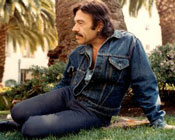
Harold Norse 1916-2009
Some writers put their effort into living, while others strive to leave much work behind. Beat poet Harold Norse knew the literary giants of several generations and lived long and well, leaving only a few fine books as evidence. He has cameo roles in the lives of, amongst many, W.H Auden, William Carlos Williams, Paul Bowles, James Baldwin, and Tennessee Williams. His handsome presence will continue to slip between the pages of their lives as long as they are written about. A true maverick, he was a beguiling character, one who deserves a wider readership, but most of his work appeared via small presses, so he will now likely remain a respected footnote.
The illegitimate son of a Russian immigrant, Norse was born in Brooklyn on July 6, 1916. He took the name Albaum, the surname of his mother's eventual husband, but the intellectual child proved unpopular with his new father, who was often physically cruel.
Bright and intelligent, Norse won the poetry prize while a freshman at Brooklyn College, which was where he met Chester Kallman, with whom he had a relationship prior to Kallman's meeting with W.H Auden. Although Norse was hired as Auden's secretary, Kallman became Auden's companion, and Norse was eclipsed -- but he had begun to mix with the literary elite who gravitated around the English poet.
He became friends with James Baldwin, shared a room with Tennessee Williams in Provincetown when he was laboring over The Glass Menagerie, and by the time he graduated with a M.A. in English and American poetry in 1951 from New York University, was becoming a recognized literary force. It was in that year that he took to using the name Norse.
His friendship with William Carlos Williams grew from a mutual respect for each other's talents and individual styles, with Williams described him as "the best poet of his generation."
When Norse published his debut, The Undersea Mountain, it failed to generate much interest, so he moved continents, taking up residence in Rome, where he remained for five years, leading a libertine life and translating the sonnets of Giueseppe Gioacchino Belli from 19th Century Roman into what could only be described as New York street slang. These were published in 1960 with prefaces from William Carlos Williams and Alberto Moravia.
In 1959 Norse was in Paris, libertine as ever, and mixing with William Burroughs, Allen Ginsberg and Gregory Corso. They shared ideas and their bodies, a sexually charged quartet in the so-called Beat Hotel, and although Norse was an equal pioneer with Burroughs and Brion Gysin of the 'cut-up' technique, Burroughs garnered the initial credit and success, via The Naked Lunch. Norse rather missed the moment, but his Beat Hotel, when it surfaced in 1973, proved a more moderate success.
He next moved to Tangiers, living there with Paul Bowles, and then in 1968 he returned to the States, initially to Los Angeles, where he became friendly with Charles Bukowski, and finally to San Francisco, where his wanderings ceased.
In 1969 he was published along with Bukowski and Philip Lamantia in the Penguin Modern Poets series, and throughout the Seventies his reputation was enhanced when Lawrence Ferlinghetti's City Lights published Hotel Nirvana and Gay Sunshine Press championed his Carnivorous Saint, which earned a National Book Award nomination.
His real testament may be his incisive and witty autobiography, Memoirs of a Bastard Angel, with an introduction by James Baldwin.
Also noteworthy are the volume of his letters with Williams, The American Idiom. A Correspondence (1990), his memoir of Bukowski, Fly Like a Bat Out of Hell (2002), and his collected poems In The Hub of the Fiery Force (2003). William Norse may not have tasted the lingering or lasting success of Ginsberg, Burroughs, or Kerouac, but his individualistic nature makes him a writer of considerable note.
He transcended the labels others sought to attach to him. As one reviewer of his autobiography remarked, "he was beat before the Beats, hip before the hippies, and out of the closet long before gay liberation." Although frail, and living in a care home, he had the genius to utter perfectly measured last words, and the luck to have them caught by an attentive nurse: "The end is the beginning."
